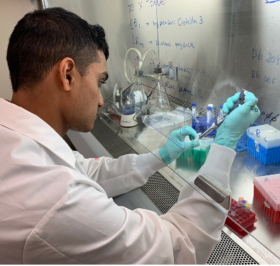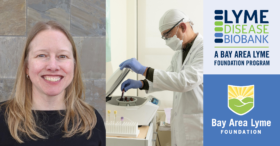BAL Spotlight Series
In this interview, the LymeX Diagnostic Prize talked with Liz Horn, PhD/MDI, Principal Investigator for Bay Area Lyme Foundation’s Lyme Disease Biobank (LDB), about her work in Lyme disease, the challenges researchers face, how the LymeX Diagnostics Prize could help further our understanding of the disease and how Lyme patient samples from our biobank are critical to the competition’s success.
This interview has been edited from the original.
“What’s exciting about the LymeX Diagnostics Prize is that you have a lot of different people with good ideas and different teams with a lot of different technologies trying to solve this problem.”
– Liz Horn, PhD/MDI
 The LymeX Diagnostics Prize is a multiphase competition funded by the US Department of Health and Human Services (HHS) and the Steven & Alexandra Cohen Foundation to accelerate the development of Lyme disease diagnostics. Through October 2023, the 10 teams selected to be part of Phase 2 of the LymeX Diagnostics Prize are participating in a virtual accelerator designed to help them refine their concepts for detecting active Lyme disease infections in people. As the Phase 2 accelerator cohort continues to develop their diagnostics, the teams have access to scientific advisors who provide valuable insight and feedback from their extensive experience in Lyme disease diagnostics, one of whom is Dr. Horn. The Phase 2 cohort also has access to the blood and urine samples donated to LDB by Lyme patients.
The LymeX Diagnostics Prize is a multiphase competition funded by the US Department of Health and Human Services (HHS) and the Steven & Alexandra Cohen Foundation to accelerate the development of Lyme disease diagnostics. Through October 2023, the 10 teams selected to be part of Phase 2 of the LymeX Diagnostics Prize are participating in a virtual accelerator designed to help them refine their concepts for detecting active Lyme disease infections in people. As the Phase 2 accelerator cohort continues to develop their diagnostics, the teams have access to scientific advisors who provide valuable insight and feedback from their extensive experience in Lyme disease diagnostics, one of whom is Dr. Horn. The Phase 2 cohort also has access to the blood and urine samples donated to LDB by Lyme patients.
A cancer biologist by training, Dr. Horn has spent her career working with nonprofit research organizations to help build research programs, registries, and biorepositories. She joined Bay Area Lyme Foundation in 2013 to lead the creation of a Lyme disease biorepository. As a scientific advisor for the LymeX Diagnostics Prize, Dr. Horn is mentoring participating teams through office hours and webinars.
LymeX: As the principal investigator for the Bay Area Lyme Foundation’s Lyme Disease Biobank, you have extensive experience in Lyme disease research. How did you first start working in the field, and what are you focusing on now with the biorepository?
